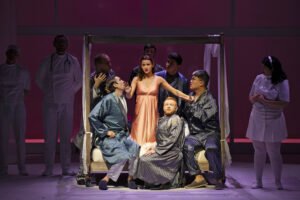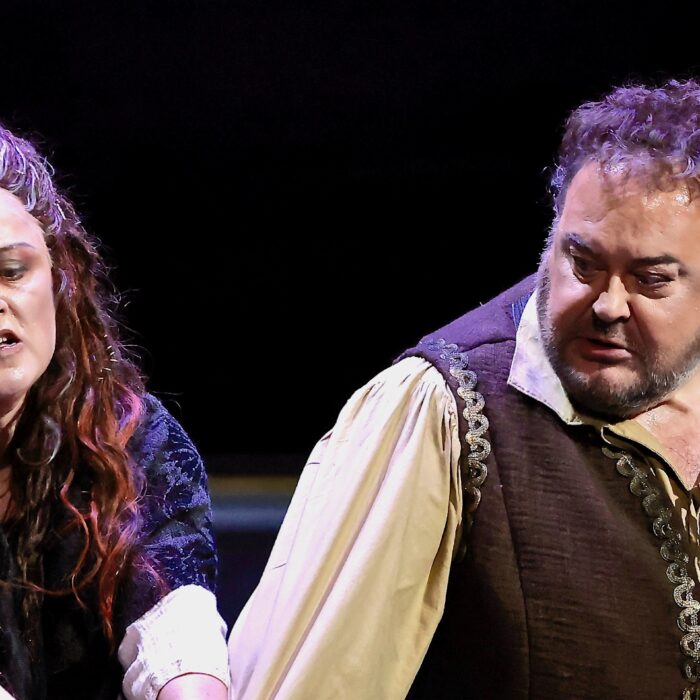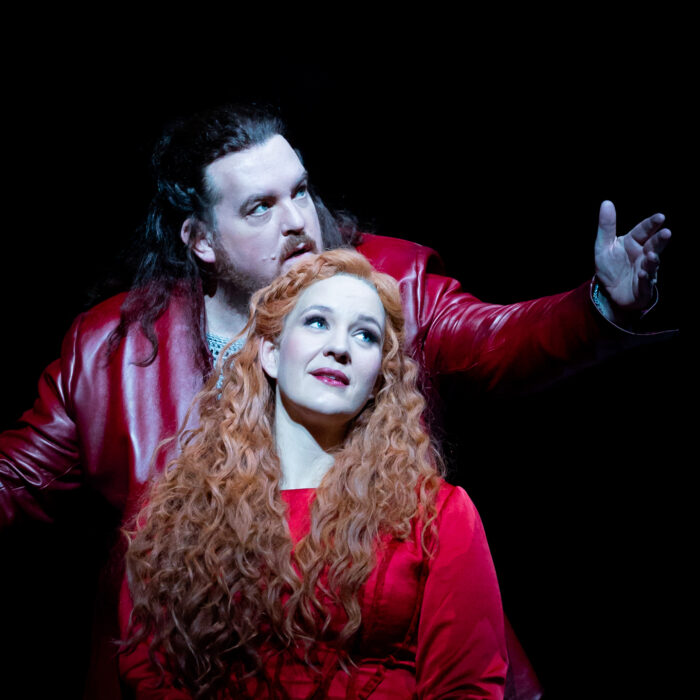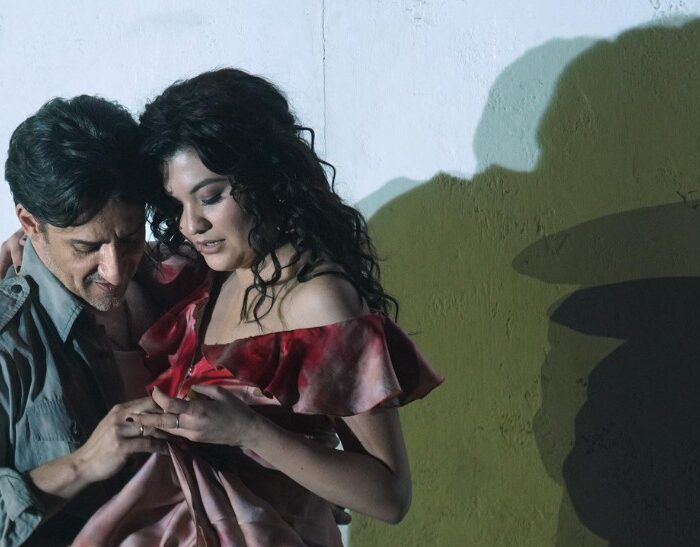
Wexford Festival Opera 2025 Review: Il Viaggio A Reims
The Wexford Festival Academy Showcases Excellent Performances From a Stellar Cast
By Alan Neilson(Photo: Padraig Grant)
The Wexford Factory Academy is a program offering young singers the opportunity to take part in workshops, masterclasses and performances in the weeks leading up to and during the festival. The highlight of the program is a fully staged production on the festival’s main stage, in which all the roles are performed by the Factory singers.
The opera selected for this year’s festival was Rossini’s 1825 comic opera “Il Viaggio a Reims,” which, with its large number of substantial roles, proved to be an ideal choice for the singers to display their talents.
With a libretto by Luigi Balocchi, the narrative is little more than an amusing romp about a gang of aristocrats and other well-to-do individuals from across Europe traveling to Reims for the coronation of the French king. Of course, everything goes wrong; the hotel in which they are staying has no horses to transport the guests, and so, instead, they decide to head to Paris for the coronation banquet that will be held on the following day. While they await the arrival of the new horses, they pass the time by celebrating the coronation in the hotel. In effect, the story is little more than a framework for the singers to show off their voices against a background of fun and laughter.
Cucchi Successfully Exploits the Comic Potential
The stage director for the production was the festival’s artistic director, Rosetta Cucchi, who, with her experience of bringing many of Rossini’s operas to the stage, can be relied upon to ensure that the comic possibilities of the work will be fully developed.
The characters all have decidedly odd, although certainly not criminal, eccentricities, which at times can border on the insane, and so Cucchi switched the location from the ‘Hotel del Giglio d’oro’ to an asylum of the same name. We watch as the characters parade around the stage indulging in their obsessive delusions: Barone di Trombonok sees himself as a conductor-cum-magician, who even attempts to conduct the orchestra, while the precious Contessa di Folleville will not allow her feet to touch the floor and has to be carried around the stage and placed on a cushion. Then, there is the romantic Count Belfiore, who is obsessed with his appearance and loves mirrors, and the Roman poetess Corinna, who plays out the role as a 1960s hippy, and the widowed Marchesa Melibea, who walks around with a lead and dog collar but without a dog. And so it continues; even the hotel owner, Madama Cortese, who goes around issuing instructions and is prone to severe facial twitches, is a patient.
The costumes, designed by Massimo Carlotta, were brightly colored and created to reinforce each character’s quirky behavior. The set was simple and rarely changed from a plain blue background against which white frames were positioned to suggest windows and doors. It was only the changes to the lighting and the addition of occasional props that altered the staging to any significant extent, and it worked well as it thrusted the attention firmly onto the bizarre behavior of the patients and the nursing staff, who acted more like regimented guards.
Many Excellent Performances From the Young Cast
The cast may all have been in the early stages of their careers, but all produced very good performances, both as singers and as comic actors.
Soprano Forooz Razavi playing the role of Madama Cortese marched onto the stage with an authoritative swagger, giving the impression that she was indeed the owner of the asylum. It was only slowly, through well-placed twitches and other instances of odd behavior, that it became clear that she, too, was a patient. And from that point onwards, her behavior became more eccentric. It was very cleverly done! She accompanied her strong acting with an excellent vocal presentation, in which she showed off her secure, attractive and flexible singing, pinging out the top notes with ease, indulging in pleasing passages of coloratura and engaging comfortably with Rossini’s signature quick-patter lines.
The role of Madama Cortese was shared with soprano Maria Matthews, who for this performance was cast in the small role of Modestina, which she delivered clearly and comfortably but, unfortunately, gave her little opportunity to display the full range of her talents.
Soprano Jane Burnell produced a confident, clearly defined reading of the Contessa di Folleville, in which she successfully captured the comic absurdity of her character; having lost her suitcases and unable to place her feet on the floor, she had to be carried hither and thither as she tried to cope with the resulting horrendous inconvenience, which drew plenty of laughter from the audience. It was also a role that allowed her to show off the versatility, tonal clarity and beauty of her voice as she energetically and enthusiastically grappled with her character’s petty concerns, weaving bright, delicately fashioned lines that included short, sparkling passages of coloratura.
Soprano Laura Aherne shone in the role of Corinna with a well-crafted, beautifully sung performance that showed off her vocal flexibility, control and sensitively crafted phrasing to good effect, which she used imaginatively and precisely to develop her character that appeared to have stepped right out of the 1960s.
The role was shared with soprano Sarah Shine, who for this performance played the relatively small role of the Greek orphan, Delia, for which she produced a solid reading.
A Non-Existent Dog Also Catches the Limelight
Mezzo-soprano, Valeria Gorbunova’s characterization of Marchesa Melibea was superb; she seemed to operate in a world of her own and watching her trying to control her non-existent dog was hilarious. She possesses a colorful voice with a rare, alluring timbre that she employed confidently to create a compelling vocal portrait of the Polish widow.
She shared the role with mezzo-soprano Helen Stanley, who, in this performance, was cast in the small role of Maddalena, in which she still managed to impress with her convincing vocal characterization.
Tenor Yu Shao convinced as the womanizing Cavalier Belfiore, boasting a voice with a suitably romantic lilt, which he used successfully to develop his character. In true romantic style, he showed himself to be self-obsessed, enjoying his own reflection in mirrors.
The tenor Seán Tester, who made a fine impression at this summer’s Blackwater Valley Opera Festival’s production of Britten’s “A Midsummer Night’s Dream” in the role of Snout, successfully built on it with an appealing, lyrically strong interpretation of the Russian, Conte Libenskof. He possesses a secure, flexible and resonant, even heroic voice with a clear, attractive tone that moves freely without displaying any signs of strain or unease.
Baritone Ihor Mostovoi showed off his Rossini credentials in the role of the antique dealer Don Profondo, which included a sparkling rendition of the lively aria “Madaglie incomparabili,” in which his quick-patter delivery impressed.
Bass Joshua McCullough, playing the role of the doctor, Don Prudenzio, often found himself at the center of silly goings-on owing to his poor eyesight, which led to much confusion. His singing was nicely fashioned, firmly grounded with a pleasing lower register.
Baritone Aqshin Khudaverdiyev, who sang with a pleasing tone, expressivity and clarity, was cast as the English colonel, Lord Sydney, whom he presented as sufficiently reticent in professing his love for Corinna.
Baritone Seamus Brady, cast as the music-obsessed Barone di Trombonok, waved his baton around in attempts to change his reality.
The remainder of the cast was comprised of tenor Conor Prendiville as Don Luigino, baritone David Kennedy as Don Alvaro, tenor Rory Lynch as Zefirino, and bass-baritone Meilir Jones as Antonio. All produced solid performances.
Manuel Hartinger created an abridged version of the score, which successfully retained the dramatic and musical shape, pace and thrust of the original, which he used to conduct the Wexford Festival Orchestra Ensemble in a lively, light and taut reading that captured the spirit of the piece.
In a final twist, the King eventually arrives on stage just in time for the final curtain. Of course, he was not a king but the doctor in charge of the asylum.
Overall, it was a very enjoyable way to pass an afternoon, one that kept the audience fully entertained throughout; not only was it a highly amusing production, but the quality of the singing from the young cast was of a high standard, evidenced that the Wexford Festival Factory is doing a fine job.



